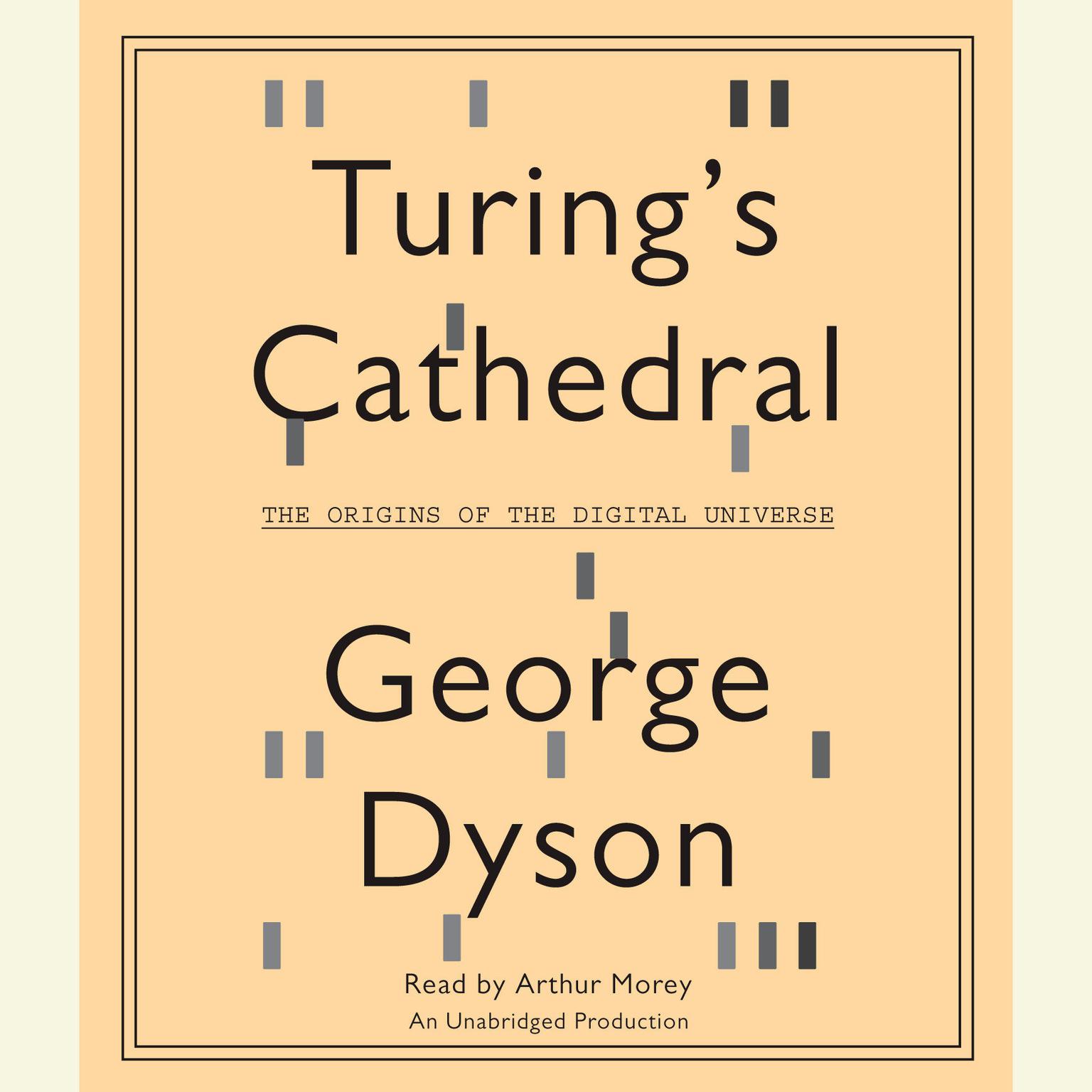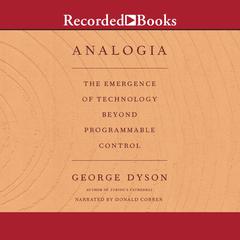 Play Audiobook Sample
Play Audiobook Sample
Turing's Cathedral: The Origins of the Digital Universe Audiobook
 Play Audiobook Sample
Play Audiobook Sample
Quick Stats About this Audiobook
Total Audiobook Chapters:
Longest Chapter Length:
Shortest Chapter Length:
Average Chapter Length:
Audiobooks by this Author:
Publisher Description
“It is possible to invent a single machine which can be used to compute any computable sequence,” twenty-four-year-old Alan Turing announced in 1936. In Turing’s Cathedral, George Dyson focuses on a small group of men and women, led by John von Neumann at the Institute for Advanced Study in Princeton, New Jersey, who built one of the first computers to realize Alan Turing’s vision of a Universal Machine. Their work would break the distinction between numbers that mean things and numbers that do things—and our universe would never be the same. Using five kilobytes of memory (the amount allocated to displaying the cursor on a computer desktop of today), they achieved unprecedented success in both weather prediction and nuclear weapons design, while tackling, in their spare time, problems ranging from the evolution of viruses to the evolution of stars. Dyson’s account, both historic and prophetic, sheds important new light on how the digital universe exploded in the aftermath of World War II. The proliferation of both codes and machines was paralleled by two historic developments: the decoding of self-replicating sequences in biology and the invention of the hydrogen bomb. It’s no coincidence that the most destructive and the most constructive of human inventions appeared at exactly the same time. How did code take over the world? In retracing how Alan Turing’s one-dimensional model became John von Neumann’s two-dimensional implementation, Turing’s Cathedral offers a series of provocative suggestions as to where the digital universe, now fully three-dimensional, may be heading next.
Download and start listening now!
"This book is a gorgeous, heart felt, nerdy labor of love. George B. Dyson writes like a dream and researches like a hard boiled heart detective. I can't recommend this book to everyone. But if you love science, tech, information theory, 20th century history and biography (you know who you are), than you just might have found your new page turner."
— Morgan (5 out of 5 stars)
Awards
-
A New York Times bestseller
-
Kirkus Reviews’ Best Books, Best Science and Nature 2012
-
A 2012 Barnes & Noble Best Book for Nonfiction
-
A Kirkus Reviews “New and Notable Title” for Nonfiction, March 2012
-
A 2012 Los Angeles Times Book Prize Nominee for Science & Technology
Turing's Cathedral Listener Reviews
-
" Tremendous book...half way thru it. "
— Bert, 2/6/2014 -
" Worth reading for the historical element. Not much to do with Turing himself but ties in a lot of coldwar history. "
— Smith, 1/30/2014 -
" Very interesting read on the early days of electronic computing and the design of some of the first computers. "
— Padraic, 1/14/2014 -
" Dense at times, but a most wonderful insight into ideas, the history these ideas are wrapped in, and how mathematics is the foundation of the evolution and the future of computers. A great book. "
— Judy, 1/12/2014 -
" Good book for listening -- especially if you like technology, particularly computing. Spans the trivial to the profound. I recommended heartily to friends and family in the computer industry. Having been there myself, I enjoyed the book very much, but am glad I used the audio version. "
— Lily, 6/9/2013 -
" I wanted to like this book, particularly a this is a historical period that I've been particularly interested in of late. But I found the first hundred pages too dry to hold my attention and couldn't finish. "
— Sarah, 4/17/2013 -
" Really great science writing focusing on the micro-politics between the researchers at the Institute for Advanced Studies at Princeton. It was both fun and difficult to follow who was who doing what where. "
— Joe, 10/12/2012 -
" I thought this was a fascinating look into the beginnings of the digital world, especially for someone who is not very aware of the history. The writing I found to be clear and not overly technical, but more about the people behind the ideas. "
— Bill, 10/11/2012 -
" Interesting reading with lots of facts but not what one would expect by the title. Whole passages seem to be off the point however interesting they may be. "
— Michael, 9/27/2012 -
" I learned a lot about computers and eastern European people! Also, apparently DNA and biology had a lot to do with how computer programs were created in the 50s and 60s. That might be a spoiler. "
— Brian, 8/9/2012 -
" Very challenging read but able to get through it, which was pretty satisfying. Great story about computers, IAS, personalities, bombs, and automata. "
— Christopher, 3/19/2012
About George Dyson
George Dyson is a historian of technology and the author of several books including Turing’s Cathedral, Project Orion, and Darwin among the Machines. His subjects range from the development (and redevelopment) of the Aleut kayak to the evolution of artificial intelligence.
About Arthur Morey
Arthur Morey has won three AudioFile Magazine “Best Of” Awards, and his work has garnered numerous AudioFile Earphones Awards and placed him as a finalist for two Audie Awards. He has acted in a number of productions, both off Broadway in New York and off Loop in Chicago. He graduated from Harvard and did graduate work at the University of Chicago. He has won awards for his fiction and drama, worked as an editor with several book publishers, and taught literature and writing at Northwestern University. His plays and songs have been produced in New York, Chicago, and Milan, where he has also performed.




